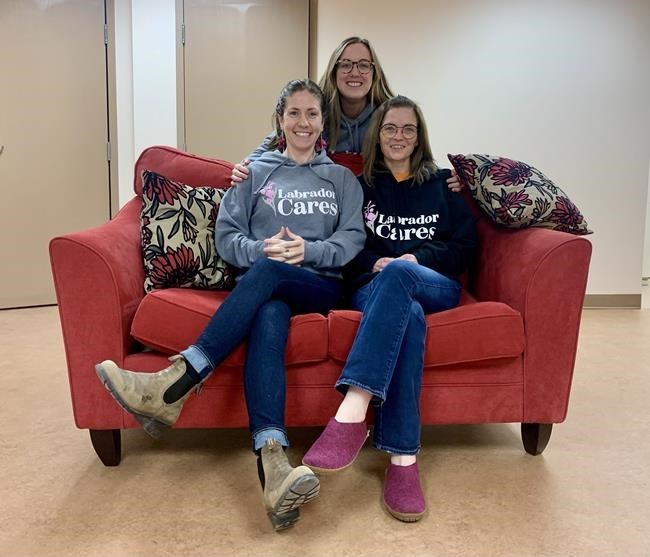HAPPY VALLEY-GOOSE BAY, N.L. — As burnout and high turnover plague groups that work to combat violence against women across Canada, community organizations in Labrador are trying to buck the trend. They have begun holding regular meetings in an effort to ease the emotional strain of working alone in far-flung communities, in a region with unique challenges and high rates of sexual assault.
The effort has resulted in higher spirits, more hope and plans for a new counselling centre in Happy Valley-Goose Bay, N.L.
"This is kind of like the aftercare that we all need as service providers," said Nicole Dicker, who runs Nain Safe House, the women’s shelter in the community of about 1,100 people on Labrador's north coast. "We can be alone together."
Across Canada, those who work with victims of gender-based violence are burning out, and the COVID-19 pandemic has only added to their stress, said Robyn Hoogendam, manager of research and policy at Women's Shelters Canada. Last year, her organization launched the Feminist Brain Drain Study, looking at the mental health of shelter staff across the country and how it affects retention. The study is in the final stages, but Hoogendam said so far, respondents have reported increased workloads and stress levels.
"While we can’t definitely say that burnout has increased through the pandemic, we heard from workers that they were experiencing burnout. With increases in the rates of violence and the severity of violence, staff have larger caseloads," she said in an email.
Her organization's national survey of shelter and transition house workers across Canada also found that 1,300 front-line staff and 126 executive directors or managers left their organizations in 2022, which is roughly 27 per cent of the workforce represented in the study. Burnout and low pay were among the most common reasons for staff leaving, the survey says.
Labrador has particular challenges. The police-reported sexual assault rate in the region is between four and six times the national average, according to data from the Royal Newfoundland Constabulary and the RCMP spanning a period between 2016 to 2020. The two forces share policing duties in the region, which is home to about 27,500 people spread out over an area that makes up almost three-quarters of the province's land mass. Resources are scarce and scattered.
In Nain, one of five fly-in Inuit communities along the region’s northeast coast, housing shortages and overcrowding add to the problem, Dicker said in an interview. Without an adequate supply of homes in the remote community, women have nowhere to go if they are being hurt at home.
The pandemic has been hard on Dicker and her staff, and it created a lot of extra work on top of the isolation and the systemic issues in her community that contribute to high rates of violence against women, she said. But the regular meetings with her peers have brought her hope.
The meetings began in earnest last year, and there are now 26 people from organizations all over the region regularly taking part, said Petrina Beals, the executive director of Violence Prevention Labrador, who is based in Happy Valley-Goose Bay. Other members of the coalition credit Beals for pulling the gatherings together, but she brushes the accolades aside.
Beals said the conversations, which people join in person or by video, have given those working emotionally demanding jobs a place to open up about their struggles and feel less alone. Her organization has since pooled resources with two others — the Mokami Status of Women Council and the Newfoundland and Labrador Sexual Assault Crisis and Prevention Centre — to rent a small, one-storey office building in Happy Valley-Goose Bay, with plans to turn it into a counselling centre for people affected by gender-based violence.
They moved in last month and the space is still largely empty, except for two red couches, an armchair and piles of newly unboxed and neatly stacked hoodies that say, "Labrador cares." It's the working slogan for the coalition, said Stacey Hoffe, Mokami's executive director. "I think that's the message we've all come to," she said. "It was a real epiphany of what we needed."
Deirdre Connolly, with the crisis and prevention centre, was interviewed for several news stories in 2021 about sexual assault rates in Labrador.
"There was a lot of feedback that, 'Hey, we know sexual violence and gender-based violence, colonial violence, is widespread .... What are we doing about that?'" she said. At the time, it was a tough question for her to answer, she said, because back it felt like she was working in a silo.
Now she feels supported and part of a real solution. Sharing the costs, Connolly, Hoffe and Beals have created a position for someone to spend the summer researching how they can build a roster of counsellors who will understand Labrador and want to stay. The person will also look at how the centre can care for its counsellors so they stay healthy in an emotionally difficult job. There's no date yet for opening, but they said they'll be closer to setting one in the fall.
"Labrador has had to take care of itself forever," Beals said. "This is just bringing Labrador back to its core."
This report by The Canadian Press was first published May 17, 2023.
Sarah Smellie, The Canadian Press




